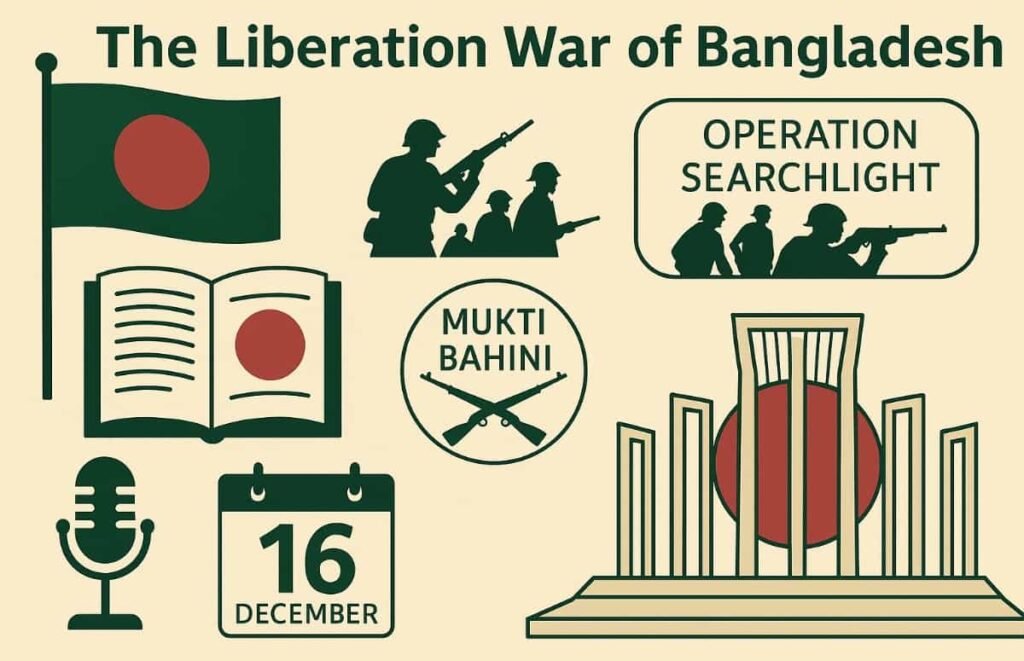The Liberation War of Bangladesh Paragraph: 200 & 400 Words

Paragraph – 200 Words
The Liberation War of Bangladesh
The Liberation War of Bangladesh in 1971 was a historic struggle for independence and self-determination. For many years, the people of East Pakistan faced political neglect, economic discrimination, and cultural suppression by the central government in West Pakistan. The situation worsened after the 1970 general election, where the Awami League, led by Sheikh Mujibur Rahman, won a majority but was denied power. The refusal to transfer authority led to political unrest, protests, and violent crackdowns.
On March 25, 1971, the Pakistan Army launched Operation Searchlight, a brutal military campaign to suppress the Bengali population. The Pakistan Army killed thousands in Dhaka and other cities, sparking the beginning of the Liberation War. Millions of civilians fled to India as refugees, while freedom fighters organized the Mukti Bahini to resist the occupation. The war continued for nine months, marked by guerrilla attacks, armed resistance, and immense civilian suffering.
International support grew as the atrocities were exposed. Finally, on December 16, 1971, after joint military efforts by the Mukti Bahini and the Indian Army, Pakistani forces surrendered in Dhaka. Bangladesh emerged as an independent nation, marking the end of decades of exploitation.
The Liberation War remains a source of pride and sacrifice for the people of Bangladesh. It symbolizes the courage of ordinary citizens who fought for freedom, justice, and the right to shape their destiny.
Paragraph – 400 Words
The Liberation War of Bangladesh
The Liberation War of Bangladesh in 1971 was one of the most significant events in South Asian history. It was a nine-month-long struggle that led to Bangladesh’s independence from Pakistan. The conflict had deep political, economic, and cultural roots. Since the creation of Pakistan in 1947, the people of East Pakistan have faced economic exploitation, cultural repression, and political discrimination from the central government in West Pakistan. The situation reached its peak during the 1970 general elections, when the Awami League, led by Sheikh Mujibur Rahman, secured a landslide victory. Despite this clear mandate, the ruling authorities in West Pakistan refused to transfer power, which fueled anger and protests across East Pakistan.
Tensions escalated further when peaceful movements were met with violence. On the night of March 25, 1971, the Pakistan Army launched Operation Searchlight to crush the Bengali nationalist movement. Cities like Dhaka witnessed horrific massacres, with thousands killed overnight. The Pakistan Army attacked universities, homes, and villages, forcing millions to flee to neighboring India. This marked the beginning of the Liberation War.
Bengali resistance fighters, known as the Mukti Bahini, organized guerrilla warfare to weaken the occupying forces. They were supported by local villagers, students, and defected members of the army. Despite limited resources, the Mukti Bahini carried out successful operations, disrupting communication lines and attacking enemy strongholds. The people’s determination, combined with growing international sympathy, brought global attention to the conflict.
By December 1971, India entered the war in support of Bangladesh, following cross-border tensions and the refugee crisis. On December 16, 1971, Pakistani forces formally surrendered in Dhaka. The victory marked the birth of Bangladesh as a sovereign nation.
The Liberation War is remembered not only as a fight for political freedom but also as a struggle for human rights, dignity, and cultural identity. It stands as a testament to the resilience of a nation determined to overcome oppression and shape its future.
FAQ
The Liberation War of Bangladesh in 1971 was a nine-month-long struggle for independence from Pakistan, leading to the birth of Bangladesh on December 16, 1971.
Political injustice, economic exploitation, and cultural suppression by West Pakistan, especially after ignoring the 1970 election results, caused the Liberation War of Bangladesh.
The war began on March 26, 1971, following the Pakistan Army’s crackdown, and ended on December 16, 1971, with the surrender of Pakistani forces.
Bengali freedom fighters, known as the Mukti Bahini, fought the war with support from ordinary citizens and later assistance from the Indian Army.
It represents the struggle for freedom, dignity, and the creation of an independent Bangladesh, inspiring generations to value independence and justice.